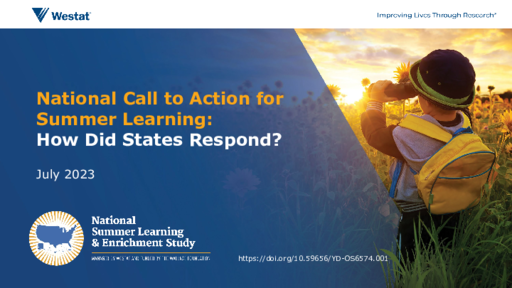Back to Overview
A National Call to Action for Summer Learning
Table of Contents
- Author(s)
- Allison Crean Davis, John Hitchcock, Beth-Ann Tek, Holly Bozeman, Kristen Pugh, Clarissa McKithen, and Molly Hershey-Arista
- Publisher(s)
- Westat
Page Count
34 pages
Implementation Tips
Four strategies can help sustain and strengthen states’ role in summer programming.
- Define or refine a vision that is meaningful and feasible. This vision should be informed by evidence. The evidence base should draw on summer learning and enrichment research, and what is known about student needs, school district and stakeholder input, and states’ prior experience.
- Understand and use the four levers available to influence policy and shape district practice. These levers are a) how funding is distributed, b) how partners are engaged, c) what program implementation priorities a state chooses, and d) what program evaluation priorities it selects.
- Take advantage of time to plan. With more experience and more time to plan, states can find new opportunities to use funds, collaborate with partners, guide and support school districts, and ask for feedback on student engagement and benefits.
- Communicate clearly with districts and families to describe the benefits of summer learning and enrichment. States can work to change out-of-date perceptions that "summer school" is punitive. How? By promoting the idea that summer experiences can be enriching and fun and foster healthy social and emotional growth.
Topics:



